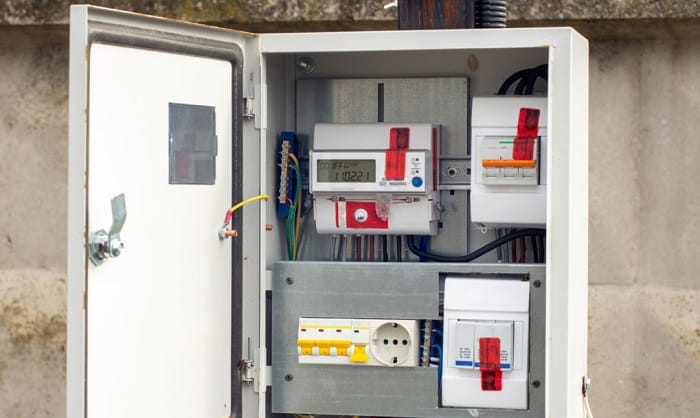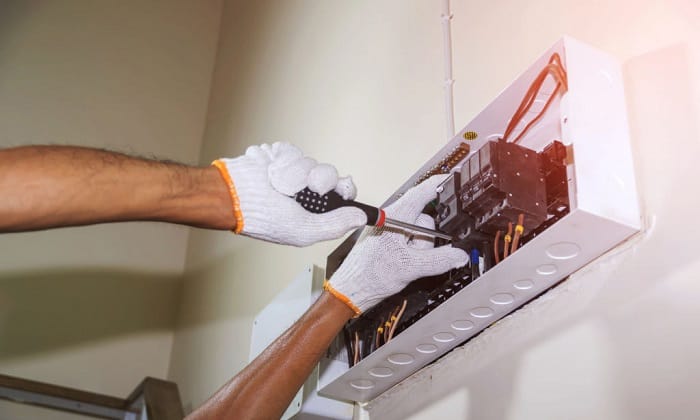If you’ve been wondering, “what size breaker box do I need for a detached garage?”. As I did in the past, know that the most recommended option for most cases is 50 amps. That’s not a categorical answer, though, since it’s perfectly fine to go up to 100 amps or even 400 amps in some cases. Of course, you’ll have to make sure that you use proper wiring for the specific amperage you settle on.
If you want to know why 50 to 100 amps are the typical range for a garage breaker box, please take the time to read the detailed answer I provided below.
Table of Contents
Factors That Affect the Total Amperage Load in Detached Garages
The size of the breaker box for a garage innately factors in the distance between your home and the garage. The higher load considers the said distance, even more so in cases when the run is between the main breaker and garage. However, since we use garages differently, you will also need to account for that as well when determining whether you’ll need higher amperages.
A 100-amp subpanel in a detached garage may be enough to handle high-draw appliances such as refrigerators. As for basic lighting or low-load electronic devices, a 50- or 60-amp subpanel in a detached garage may suffice. You’ll likely have to increase the ampacity further if you intend to run heavy machinery or power tools in your garage.
You need to be specific with your requirements, in short, while taking into consideration the current that will run between your home and garage. No less than the exact calculations have to be taken into account.
Other Important Guidelines That You May Need to Know
Assuming you don’t already know these other factors, it’s well worth doing so because I’m assuming you wanted the answer to this question because your main goal is to properly add a new electrical service to a detached garage. Here’s a few that’s well worth remembering:
- Take note that when we mention a breaker for a garage, it’s automatically interpreted as a subpanel. In fact, a small breaker box for a garage or a large one is always understood as a subpanel in most cases. Subpanels are the recommended choice because they take the hassle out of accounting for voltage drops, though not entirely.
- If you haven’t already installed a subpanel and want to do it yourself, here’s a video that should teach you all you need to know about it:
- Double-check whether your local code requires you to use a GFCI breaker or not. Most but certainly not all garages in the US actually use a GFCI breaker.
- You’ll need to properly ground the subpanel as well. This is a wholly different topic in itself and has its own requirements you need to be aware of.
- Lastly, it pays to anticipate your long-term electrical needs when using the garage and installing a dedicated panel for it. You may think that a 50-amp breaker will do for now, but what if you decide to do some DIY activities in your garage in the future? Allotting at least 20% extra power capacity may be a wise move, especially if you think about the additional expenses that an upgrade readily entails.
Don’t Forget to Always Use the Right Wiring
Knowing the right size to use for your breaker box is just half of the equation. You’ll also need to make sure it pairs well with the wiring you use. In the case of 50-amp breakers, only 8/3 wires will suffice.
If you decide to go for higher amperages, making that move already changes the wiring sizes as well. Always stick to what’s recommended by the National Electric Code. No more, no less.
Conclusion
When knowing the right-sized breaker box for a detached garage, always anticipate the entire run of the circuit as well as your own power needs while inside the garage. The more you account for future needs and the more specific you get, the better.
There’s no better way to ensure your project will succeed than opting for this route. Of course, if you think you can’t handle it alone anymore, it’s better to call an electrician.
Hope you find this article on what size breaker box do I need for a detached garage helpful. If you need anything else, please let me know in the comment section.

I am Edwin Jones, in charge of designing content for Galvinpower. I aspire to use my experiences in marketing to create reliable and necessary information to help our readers. It has been fun to work with Andrew and apply his incredible knowledge to our content.


